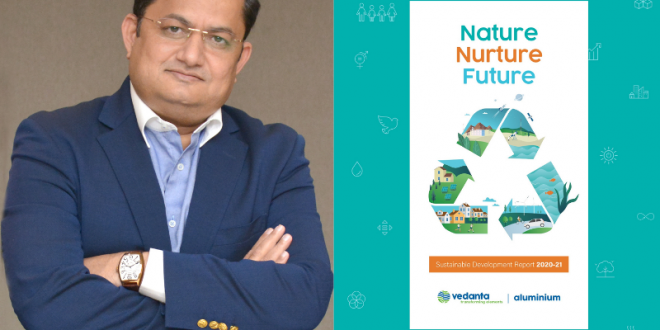New Delhi: Vedanta Aluminium Business, India’s largest producer of aluminium and its value-added products, unveiled its Sustainable Development Report(SDR) for FY 2020-21 today i.e., National Energy Conservation Day, in a campus connect program with the TERI School of Advanced Studies (TERI SAS). Students, alumni and faculty from TERI SAS participated in the programme.
Titled ‘Nature, Nurture, Future’, Vedanta Aluminium’s Sustainable Development Reportencapsulates the Business’ performance across key sustainability parameters such as Energy and Climate Change Management, Water Management, Biodiversity Management, Air Quality and Emissions control, Health & Safety, Social Impact and Governance,etc. for the FY 2020-21 performance period.
The report can be accessed on the company website:www.vedantaaluminium.com
Launching the report, Rahul Sharma, CEO – AluminiumBusiness, Vedanta Ltd. said, “The principles of sustainability are imbibed in every aspect of the way we conduct our business. It is imperative for us that our business growth materializes in a sustainable manner through judicious and responsible utilization of resources, the highest efficiency of assets and processes, and a focused approach towards carbon mitigation. We are committed to the decarbonisation of our operations in the long term. As India’s largest aluminium producer, we are unrelenting in our pursuit of excellence in all aspects of business, including Environment, Social and Governance (ESG).”
Prof. Shaleen Singhal, Dean (Research and Partnerships) at TERI SAS, added, “TERI School of Advanced Studies students and faculty members are delighted to be part of this launch event that demonstrates Vedanta Aluminium’s commitment to sustainability. This unique university-corporate partnership shall advance the frontiers of knowledge creation and practice for sustainable development.”
Prepared in accordance with the global reporting Initiative (GRI) Standards, the report outlines Vedanta Aluminium’s approach to sustainable and responsible development aligned to United Nations Global Compact (UNGC) Principles and united Nations Sustainable Development Goals (UN-SDGs).
 Update Odisha-Latest Odisha News I Breaking News Get latest news on Odisha, Govt. Jobs, OSSC, OPSC, Entertainment, Crime, Sports, and Education
Update Odisha-Latest Odisha News I Breaking News Get latest news on Odisha, Govt. Jobs, OSSC, OPSC, Entertainment, Crime, Sports, and Education



